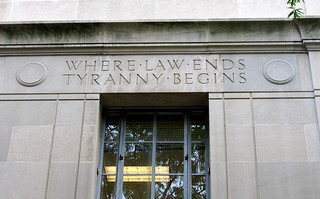Copyright 2007-25 Digital Media Law Project and respective authors. Except where otherwise noted,
content on this site is licensed under a Creative Commons Attribution-Noncommercial-ShareAlike 3.0 License: Details.
Use of this site is pursuant to our Terms of Use and Privacy Notice.
content on this site is licensed under a Creative Commons Attribution-Noncommercial-ShareAlike 3.0 License: Details.
Use of this site is pursuant to our Terms of Use and Privacy Notice.


 When hearing the expression “lèse majesté,” images of the Queen of Hearts ordering heads to be chopped off ASAP may come to mind. Marie-Antoinette, the queen who was once a “majesté” in France, herself lost her head during the French Revolution. Surely, the crime of lèse majesté is now a thing of the past?
When hearing the expression “lèse majesté,” images of the Queen of Hearts ordering heads to be chopped off ASAP may come to mind. Marie-Antoinette, the queen who was once a “majesté” in France, herself lost her head during the French Revolution. Surely, the crime of lèse majesté is now a thing of the past?
 Another day. Another "I created Facebook first" case.
Another day. Another "I created Facebook first" case.
 There has always been an active debate about whether the First
Amendment affords government outsiders (like the media) any protection
when they disseminate classified national security information without
authorization.
There has always been an active debate about whether the First
Amendment affords government outsiders (like the media) any protection
when they disseminate classified national security information without
authorization. In the fourteen years that I practiced as a media defense lawyer before joining the Berkman Center, there was one sentence from one Supreme Court opinion that I learned to loathe above all others. It appears in
In the fourteen years that I practiced as a media defense lawyer before joining the Berkman Center, there was one sentence from one Supreme Court opinion that I learned to loathe above all others. It appears in  The DMLP recently appeared as an amicus curiae in Commonwealth v. Busa, a case brought in Boston Municipal Court under Massachusetts's anti-counterfeiting law,
The DMLP recently appeared as an amicus curiae in Commonwealth v. Busa, a case brought in Boston Municipal Court under Massachusetts's anti-counterfeiting law,  Last week the Digital (nee Citizen) Media Law Project joined
Last week the Digital (nee Citizen) Media Law Project joined  Earlier this week the CMLP (under its new name, the Digital Media Law Project) sought leave to file
Earlier this week the CMLP (under its new name, the Digital Media Law Project) sought leave to file  In May 2010, Christopher Sharp used his cell phone to record video of his friend being arrested by the Baltimore Police at the Preakness Stakes. The police demanded that Sharp surrender his phone, stating that the contents might be evidence; when the phone was returned, Sharp discovered that the video he had made, plus a number of other unrelated videos, had been deleted.
In May 2010, Christopher Sharp used his cell phone to record video of his friend being arrested by the Baltimore Police at the Preakness Stakes. The police demanded that Sharp surrender his phone, stating that the contents might be evidence; when the phone was returned, Sharp discovered that the video he had made, plus a number of other unrelated videos, had been deleted. Despite the welcome 7th Circuit decision
in
Despite the welcome 7th Circuit decision
in  Once again, the CMLP is pleased to report that the First Amendment has scored an important victory in a case involving the recording of police officers in public. Last summer saw the
Once again, the CMLP is pleased to report that the First Amendment has scored an important victory in a case involving the recording of police officers in public. Last summer saw the  What happens when the First Amendment collides with military decorum and respect for chain of command?
What happens when the First Amendment collides with military decorum and respect for chain of command?
 Venkat Balasubramani and Eric Goldman, over
Venkat Balasubramani and Eric Goldman, over  Say you're in law school, and your professor gives you the following hypothetical:
Say you're in law school, and your professor gives you the following hypothetical:

Description:
After further investigation by the Pittsfield Police Department, Nilan was charged with leaving the scene of a personal injury accident and negligent operation of a motor vehicle to endanger. Later, in a closed show cause hearing on January 12, 2012, Assistant Clerk-Magistrate Nathan A. Byrnes found insufficient evidence for the case to go to trial.
Around this time, Valenti started blogging about the developments of the case on his blog PlanetValenti.com. Valenti's blog suggested that Nilan might be receiving favorable treatment because of her father's position. He also questioned Nilan's version of events as reflected in the police report about the scene of the accident.
On February 13, 2012, Springfield District Court Judge William P. Hadley overturned the Clerk-Magistrate's determination, and held there was probable cause to charge Nilan with leaving the scene of an accident and negligent operation of a motor vehicle. She was later arraigned and charged; on June 6, 2012, prosecutors dismissed the charge of leaving the scene of an accident, and continued the misdemeanor negligent operation charge for six months Throughout these proceedings, Valenti continued to blog about the case.
On June 22, 2012, Meredith Nilan filed a complaint for a civil harassment prevention order and supporting affidavit against Valenti in the Central Berkshire (Pittsfield) District Court. Nilan claimed that Valenti's blog posts were "lies and innuendo" and a "regular and malicious attack" on her reputation. She asserted that because of Valenti's "sensational interpretations" and reader's "anonymous rants," she feared "vigilante justice," and that "Mr. Valenti's continued vitriol and his repeated inclination to print lies and sensationalize every aspect of my case has made me fear for my personal safety."
A few days later on June 27, 2012, after an ex parte hearing, District Court Judge Bethzaida Sanabria-Vega issued a harassment prevention order directing Valenti "to remove any and all information referring to the Plaintiff [Ms. Nilan] from any and all websites, blogs, etc." Also included was an order to stay 100 yards from the plaintiff and to stay away from the plaintiff's work and residence.
On his blog, Valenti wrote that he complied with the order on June 28, 2012, after recivint the order the night before.
Valenti filed a responsive affidavit on July 5, 2012, in which he detailed how he became involved in the Nilan story and responded to Nilan's claims. In his affidavit, he asserted that he had "never met her, talked with her, been near her, contacted or attempted to contact her, or spoken to Meredith Nilan, let alone 'harass'[ed] her." Valenti claimed that he reported facts "honestly, fairly, diligently, and justly," and that while he invited readers to share their views, he did not enourage outrage.
On July 9, 2012, the court held a hearing on the prevention order. According to a news report on the hearing, Valenti read his affidavit aloud, and Nilan read a statement.
Valenti's lawyer, Rinaldo Del Gallo, III, also filed a brief in his defense. In the brief, Valenti argued that he did not "harass" Nilan, as defined in the statute, because he had never met her or had any contact with her. Valenti also argued that the civil harassment statute, Mass. Gen. Laws c. 258E, does not authorize a court to proscribe or censure speech on the Internet, and that the statute would be unconstitutionally overbroad if applied to the blog. Citing O'Brien v. Borowski, 461 Mass. 415 (2012), in which the Supreme Judicial Court interpreted c. 258E to avoid overbreadth by limiting its reach to "fighting words" and "true threats," the brief further asserted that there was no "face-to-face" confrontation likely to provoke violence (as required by the "fighting words" doctrine) or "intent to commit an unlawful act" against Nilan (as required to prove a "true threat"). Rather, Valenti claimed that his blog posts were true speech on a matter of public concern, and that the the judge's previous order was an unconstitutional prior restraint under the First Amendment and Massachusetts Consitution.
Nilan did not file a response, according to the Central Berkshire District Court clerk's office.
Bill Newman, director of Western Massachusetts ACLU, submitted an amicus brief in the case, arguing that the order was an impermissible prior restraint and "sweeping censorship." The amicus argued that the order to remove previously published information is even worse than a typical prior restraint because "it does not merely 'freeze' the speaker; it requires him to bowdlerize prior speech." The amicus also argued that Nilan's affidavit did not allege "three acts of either 'fighting words' or 'true threat' by Valenti or his web site," as required by the statute.
At the July 9, 2012 hearing, Judge Mark D. Mason overruled and vacated the harassment prevention order.